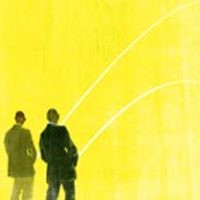What a Psychologist Learned from Jane Jacobs
By Seth Roberts
Huffington Post
Was Jane Jacobs, who died last week, disappointed by her obituaries? Sure, she was a genius who changed how we think about cities. Yes, it was fantastic how she won a battle against Robert Moses to preserve the livability and economic vitality of a large piece of Manhattan. But she wrote three books about economics (The Economy of Cities, Cities and the Wealth of Nations, The Nature of Economies) and only one about city planning (The Death and Life of Great American Cities).
Since the city-planning book was anti-city-planning, it was like (on a much smaller scale) Renata Adler being remembered for her attack on Pauline Kael. I had lunch with Jacobs a few years ago. She told me her favorite book of hers was The Economy of Cities. Her long New York Times obituary gave this book one sentence.
No doubt she saw it coming. I'm a professor of psychology at Berkeley. One day I had lunch with faculty in the public policy school. Most of them are economists. I said I really liked her work. "What do you like about it?" someone asked. Uh-oh! At a college class reunion (I graduated from Reed) several years ago I sat next to an economics professor. What do you think of Jane Jacobs's work? I asked. "Who's Jane Jacobs?" she replied. Double uh-oh!
That I, an experimental psychologist, could learn so much from her work shows there is much more to it than city planning. Much of my research involves self-experimentation, and I usually tell my students about it. Sometimes they say their other professors have said that self-experimentation is bad. In response, I turn to Jacobs. In Cities and the Wealth of Nations, she wrote about an isolated small town in North Carolina. Her aunt had been sent there in 1923. One of her aunt's goals was to build a church. Her aunt suggested to the townspeople that the church be built from the many stones that were lying around. Not possible, the townspeople replied -- you can't make buildings from stones. "These people came from a parent culture that had not only reared stone parish churches from time immemorial, but great cathedrals," wrote Jacobs. "But having lost the practice of construction with stone, people had lost the memory of it, too, over the generations and having lost the memory, lost belief in the possibility." Experimental psychology started with self-experimentation, I tell my students. It was built on self-experimentation. Your other professors have forgotten that.
I started college as an economics major, under the influence of John Kenneth Galbraith (who also died last week). I switched to psychology because I believed psychology was the basis of economics. Now this view is popular -- "behavioral economists" do psychology-like experiments to understand economic phenomena. But I've moved on: I now believe economics is the basis of psychology, at least human psychology. This is entirely because of Jacobs. She -- not Galbraith, not Veblen, not Samuelson, nor any of several dozen other economists I've read -- taught me the fundamentals of economics. This is her great achievement, in my opinion. She described how city economies work. And city economies are the basis of national economies.
After reading Jacobs, I saw that many hard-to-explain features of human psychology made sense as evolutionary adaptations to promote trade and economic growth. If two crickets or two pigeons or two octopus met at a party, neither would ask, "What do you do?" Because they would already know. All crickets make their living the same way, all pigeons make their living the same way, etc. Humans are the only animals that specialize -- for whom the job question makes sense. First came specialization (which began with hobbies). Gains from specialization led to many other features of human behavior.
1. Language. Language began with single words. These words helped "buyer" and "seller" find each other, as single words still do at a Guatemalan market where a seller shouts "toothpaste" repeatedly. Early language was the first advertising.
2. Procrastination. The mechanism behind procrastination promoted diversity of specialization because it magnified random differences. On Monday you do X and I do Y, for purely random reasons; on Tuesday we will tend to continue along our different tracks, eventually becoming expert in different things. As Jacobs said over and over, a healthy economy is a diverse economy.
3. Decoration. Our love of decoration caused us to support those who made decorations -- the first artists, who were also the first material scientists. Their discoveries, first used for art, later had more pragmatic uses.
4. Rituals/ceremonies/gifts. Most gifts involve purchase of something that neither the giver nor the recipient would otherwise purchase. Gifts are usually something "nice." Thus they help support artisans who make "the finer things"—and who by working at the edge of what's possible improve the state of their art. Rituals and ceremonies, with their special requirements (e.g., fine cloth, ornamentation), do the same. Collectors and collections, connoisseurship, music, fashion, and the poor quality of American college education can be explained in similar ways.
This theory of human evolution owes everything to Jane Jacobs.
Huffington Post
Was Jane Jacobs, who died last week, disappointed by her obituaries? Sure, she was a genius who changed how we think about cities. Yes, it was fantastic how she won a battle against Robert Moses to preserve the livability and economic vitality of a large piece of Manhattan. But she wrote three books about economics (The Economy of Cities, Cities and the Wealth of Nations, The Nature of Economies) and only one about city planning (The Death and Life of Great American Cities).
Since the city-planning book was anti-city-planning, it was like (on a much smaller scale) Renata Adler being remembered for her attack on Pauline Kael. I had lunch with Jacobs a few years ago. She told me her favorite book of hers was The Economy of Cities. Her long New York Times obituary gave this book one sentence.
No doubt she saw it coming. I'm a professor of psychology at Berkeley. One day I had lunch with faculty in the public policy school. Most of them are economists. I said I really liked her work. "What do you like about it?" someone asked. Uh-oh! At a college class reunion (I graduated from Reed) several years ago I sat next to an economics professor. What do you think of Jane Jacobs's work? I asked. "Who's Jane Jacobs?" she replied. Double uh-oh!
That I, an experimental psychologist, could learn so much from her work shows there is much more to it than city planning. Much of my research involves self-experimentation, and I usually tell my students about it. Sometimes they say their other professors have said that self-experimentation is bad. In response, I turn to Jacobs. In Cities and the Wealth of Nations, she wrote about an isolated small town in North Carolina. Her aunt had been sent there in 1923. One of her aunt's goals was to build a church. Her aunt suggested to the townspeople that the church be built from the many stones that were lying around. Not possible, the townspeople replied -- you can't make buildings from stones. "These people came from a parent culture that had not only reared stone parish churches from time immemorial, but great cathedrals," wrote Jacobs. "But having lost the practice of construction with stone, people had lost the memory of it, too, over the generations and having lost the memory, lost belief in the possibility." Experimental psychology started with self-experimentation, I tell my students. It was built on self-experimentation. Your other professors have forgotten that.
I started college as an economics major, under the influence of John Kenneth Galbraith (who also died last week). I switched to psychology because I believed psychology was the basis of economics. Now this view is popular -- "behavioral economists" do psychology-like experiments to understand economic phenomena. But I've moved on: I now believe economics is the basis of psychology, at least human psychology. This is entirely because of Jacobs. She -- not Galbraith, not Veblen, not Samuelson, nor any of several dozen other economists I've read -- taught me the fundamentals of economics. This is her great achievement, in my opinion. She described how city economies work. And city economies are the basis of national economies.
After reading Jacobs, I saw that many hard-to-explain features of human psychology made sense as evolutionary adaptations to promote trade and economic growth. If two crickets or two pigeons or two octopus met at a party, neither would ask, "What do you do?" Because they would already know. All crickets make their living the same way, all pigeons make their living the same way, etc. Humans are the only animals that specialize -- for whom the job question makes sense. First came specialization (which began with hobbies). Gains from specialization led to many other features of human behavior.
1. Language. Language began with single words. These words helped "buyer" and "seller" find each other, as single words still do at a Guatemalan market where a seller shouts "toothpaste" repeatedly. Early language was the first advertising.
2. Procrastination. The mechanism behind procrastination promoted diversity of specialization because it magnified random differences. On Monday you do X and I do Y, for purely random reasons; on Tuesday we will tend to continue along our different tracks, eventually becoming expert in different things. As Jacobs said over and over, a healthy economy is a diverse economy.
3. Decoration. Our love of decoration caused us to support those who made decorations -- the first artists, who were also the first material scientists. Their discoveries, first used for art, later had more pragmatic uses.
4. Rituals/ceremonies/gifts. Most gifts involve purchase of something that neither the giver nor the recipient would otherwise purchase. Gifts are usually something "nice." Thus they help support artisans who make "the finer things"—and who by working at the edge of what's possible improve the state of their art. Rituals and ceremonies, with their special requirements (e.g., fine cloth, ornamentation), do the same. Collectors and collections, connoisseurship, music, fashion, and the poor quality of American college education can be explained in similar ways.
This theory of human evolution owes everything to Jane Jacobs.










0 Comments:
Post a Comment
<< Home